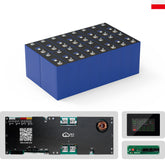Which Battery Type Stores the Most Electricity
In the quest for efficient energy storage, understanding which battery type stores electricity most effectively is crucial. From powering electric vehicles to backing up renewable energy systems, battery technologies play a pivotal role. This article delves into the various battery types, evaluating their capabilities to determine which battery truly stores electricity the most—both in volume and efficiency.
- How Energy Storage Works and Why It Matters
- Comparing Battery Technologies That Store Electricity
- Advanced Lithium-Based Batteries That Store Electricity
- Cutting-Edge Battery Technologies That Store Electricity
- Real-World Applications of Batteries That Store Electricity
- How to Choose a Battery That Stores Electricity Best for Your Needs
- Environmental Impact of Batteries That Store Electricity
- Final Verdict: Which Battery Stores the Most Electricity?
- Future Outlook for Technologies That Store Electricity
- Mastering the Science of What Stores Electricity Best
How Energy Storage Works and Why It Matters
To understand which battery stores electricity the most, we must first grasp the fundamentals of how energy storage functions.
What Does “Stores Electricity” Mean?
When we say a battery stores electricity, we're actually referring to its ability to store electrical energy in chemical form and release it when needed. The effectiveness of this process depends on the battery’s energy density, efficiency, cycle life, and overall capacity.
The Importance of Efficient Energy Storage
Batteries that effectively store electricity can drastically reduce power losses, stabilize power grids, and support the growing demands of renewable energy systems such as solar and wind. With advances in battery technology, energy storage has become more compact, more powerful, and more sustainable.
Comparing Battery Technologies That Store Electricity
Let’s explore the most common and emerging battery types to determine which stores electricity the most efficiently and effectively.
Lead-Acid Batteries
Lead-acid batteries are among the oldest types of rechargeable batteries and are still used in cars, UPS systems, and off-grid solar setups.
Key Features
Energy density: 30–50 Wh/kg
Cost-effective and recyclable
Shorter cycle life (500–1000 cycles)
While widely used, their ability to store electricity is limited by weight and lower energy density.
Nickel-Cadmium (NiCd) Batteries
These were once common in portable electronics and aviation.
Key Features
Energy density: 40–60 Wh/kg
Can tolerate deep discharges
Contains toxic cadmium
NiCd batteries store electricity moderately well but are being phased out due to environmental concerns.
Nickel-Metal Hydride (NiMH) Batteries
An improvement over NiCd, NiMH batteries are still found in hybrid vehicles and some consumer electronics.
Key Features
Energy density: 60–120 Wh/kg
Environmentally safer than NiCd
Higher self-discharge rate
While they store electricity better than older technologies, they're not the most efficient today.
Lithium-Ion (Li-ion) Batteries
Li-ion batteries have become the standard for laptops, smartphones, EVs, and home energy storage.
Key Features
Energy density: 150–250 Wh/kg
High efficiency (90–95%)
Long cycle life (1000–5000+ cycles)
Li-ion batteries are one of the best options when it comes to how much electricity they can store, offering a solid balance of capacity, longevity, and rechargeability.
>>See also How Group 21 and Group 21R Batteries Compare
Advanced Lithium-Based Batteries That Store Electricity
While traditional Li-ion batteries are powerful, several advanced lithium variants store electricity even more effectively.
Lithium Iron Phosphate (LiFePO4)
Popular in solar energy storage and EVs due to its safety and stability.
Key Features
Energy density: 90–160 Wh/kg
Over 3000–7000 cycles
Thermal stability and safety
Though slightly lower in energy density, LiFePO4 batteries store electricity reliably and with a longer lifespan.
Lithium Nickel Manganese Cobalt Oxide (NMC)
Widely used in electric vehicles and energy storage systems.
Key Features
Energy density: 150–220 Wh/kg
Balanced power and longevity
Suitable for high-drain applications
NMC batteries are highly efficient at storing electricity, making them one of the most popular choices in the market.
Cutting-Edge Battery Technologies That Store Electricity
Beyond lithium, new technologies are pushing the boundaries of how electricity is stored.
Solid-State Batteries
Considered the future of battery tech, these use solid electrolytes instead of liquid ones.
Key Features
Energy density: up to 500 Wh/kg
Extremely safe, reduced fire risk
Still in development for mass adoption
Solid-state batteries could become the definitive answer to which battery stores electricity the most in the future.
Sodium-Ion Batteries
An alternative to lithium, using abundant sodium resources.
Key Features
Energy density: 90–160 Wh/kg
Low cost and environmentally friendly
Still under active development
Although not yet mainstream, sodium-ion batteries aim to offer a scalable solution that stores electricity cost-effectively.
Flow Batteries
Used mainly for grid-scale applications.
Key Features
Energy density: 20–50 Wh/kg
Scalability is nearly unlimited
Very long cycle life (10,000+)
Flow batteries may not store electricity in high density, but their capacity can scale with the size of electrolyte tanks, making them suitable for massive installations.
Real-World Applications of Batteries That Store Electricity
Electric Vehicles
Li-ion and NMC batteries are the go-to technologies, with Tesla using NCA variants to maximize how they store electricity per kilogram of weight.
Residential Solar Storage
LiFePO4 batteries are commonly used in solar battery banks. Their safety and cycle life make them ideal for storing electricity in homes.
Commercial Energy Storage Systems
Large installations rely on lithium-based or flow batteries to store electricity on a large scale, ensuring power reliability and grid stability.
How to Choose a Battery That Stores Electricity Best for Your Needs
Consider Your Application
Portable Electronics: Li-ion for lightweight storage
Home Energy Backup: LiFePO4 for durability
Electric Vehicles: NMC or NCA for energy-dense performance
Grid Storage: Flow batteries for massive capacity
Evaluate Energy Density and Efficiency
To determine which battery type best stores electricity, compare both gravimetric energy density (Wh/kg) and volumetric energy density (Wh/L). Higher numbers mean more energy stored in less space or weight.
Think Long-Term Sustainability
Cycle life and recyclability also influence how well a battery stores electricity over time. A battery with a long life and low degradation rate is more effective in real-world applications.
Environmental Impact of Batteries That Store Electricity
Recycling Challenges and Progress
Batteries that store electricity often contain rare or toxic materials. Fortunately, recycling programs for Li-ion, NiMH, and lead-acid batteries are expanding.
Sustainable Alternatives
Sodium-ion and other newer technologies aim to reduce reliance on critical minerals while still being able to store electricity efficiently.
>>See also Choosing the Right 72V Lithium Battery Charger Made Simple
Final Verdict: Which Battery Stores the Most Electricity?
Among today’s technologies, solid-state batteries show the greatest potential to store electricity per kilogram. However, they’re not yet widely available.
Currently, lithium-ion and lithium NMC batteries offer the best mix of:
High energy density
Long cycle life
Market availability
Efficiency of 90%+
Thus, lithium-based batteries—especially NMC and NCA—are the best choices for those seeking a battery that truly stores electricity at high levels.
Future Outlook for Technologies That Store Electricity
As research continues, emerging technologies like:
Lithium-sulfur
Solid-state
Zinc-air
Iron-air
...may redefine how electricity is stored in both volume and efficiency.
Expect breakthroughs that offer:
Higher densities (600+ Wh/kg)
Ultra-long lifespans
Sustainable materials
These innovations will shape everything from smartphones to megawatt grid systems.
Mastering the Science of What Stores Electricity Best
In conclusion, understanding which battery type stores electricity the most involves evaluating various factors: energy density, cycle life, application, cost, and sustainability. While lithium-ion currently leads the market, newer innovations like solid-state batteries and flow systems are rising stars.
For now, if you're seeking the best battery that stores electricity reliably and efficiently, lithium-based options remain unmatched.
As energy demand rises and renewable sources expand, the ability to effectively store electricity becomes not just a convenience—but a necessity.
























Leave a comment
All blog comments are checked prior to publishing